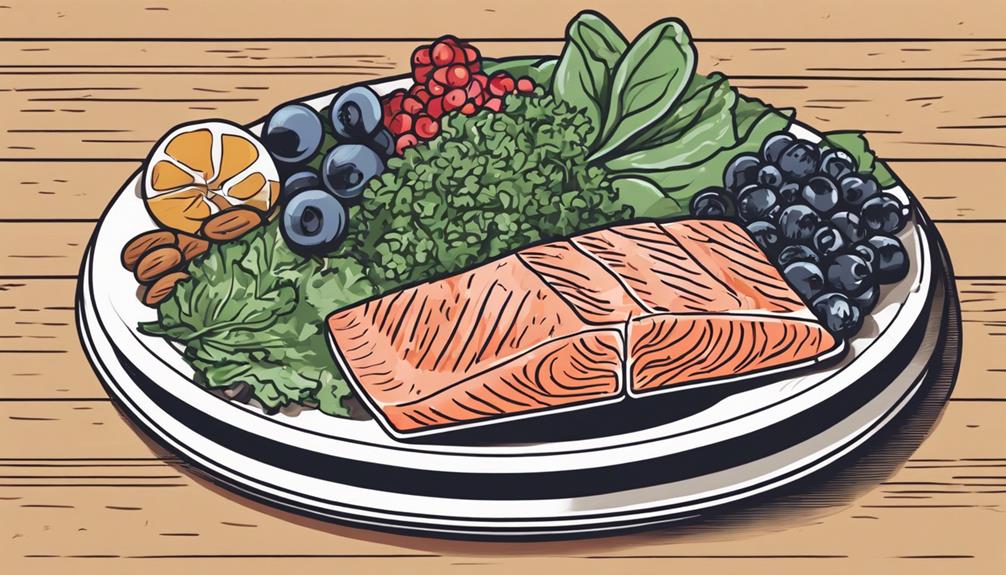You might have heard that the way to a person's heart is through their stomach, but did you know that the same can be said for managing diabetes?
Imagine a world where your meals not only satisfy your taste buds but also contribute to keeping your heart healthy while managing your blood sugar levels.
Intrigued by the idea of enjoying delicious foods that can benefit both your diabetes and heart health? Stay tuned to discover the top foods that can help you achieve just that.
Key Takeaways
- Include heart-healthy foods to manage diabetes effectively.
- Prioritize nutrient-rich options for overall health benefits.
- Experiment with flavorful dishes incorporating vegetables, fruits, and whole grains.
- Enhance heart health while controlling blood sugar levels with a balanced diet.
Benefits of Heart-Healthy Foods

By incorporating heart-healthy foods into your diet, you can significantly reduce the risk of developing cardiovascular diseases. Making simple lifestyle changes such as incorporating heart-healthy recipes can have a profound impact on your overall health. Opting for foods rich in nutrients like fruits, vegetables, whole grains, lean proteins, and healthy fats can help lower cholesterol levels, reduce blood pressure, and decrease inflammation in the body.
Consuming heart-healthy recipes doesn't have to be bland or boring. You can experiment with flavorful dishes that prioritize your heart health. Try incorporating more salads with dark leafy greens, nuts, and seeds, or explore different ways to prepare fish rich in omega-3 fatty acids. These small changes can add variety to your meals while promoting heart health.
Top Vegetables for Diabetic Hearts
Opt for a variety of colorful and nutrient-rich vegetables to support heart health while managing diabetes effectively. Vegetables play a crucial role in a diabetic-friendly diet by providing essential vitamins, minerals, and fiber. When choosing vegetables, opt for seasonal produce to ensure freshness and maximize nutritional benefits. Incorporating a range of cooking techniques such as steaming, roasting, or stir-frying can enhance the flavors and textures of vegetables while retaining their nutrients.
Leafy greens like spinach, kale, and Swiss chard are excellent choices due to their high fiber content and low glycemic index. These vegetables help regulate blood sugar levels and promote heart health. Additionally, cruciferous vegetables such as broccoli, Brussels sprouts, and cauliflower are rich in antioxidants and anti-inflammatory compounds, making them ideal for a diabetic heart.
Experiment with different vegetable combinations and flavors to keep your meals exciting and enjoyable. By prioritizing vegetables in your diet and utilizing various cooking techniques, you can create delicious dishes that support both your diabetes management and heart health goals.
Fruits That Support Heart Health

To further enhance your heart health while managing diabetes, consider incorporating a variety of fruits known for their beneficial properties. Berries, such as blueberries, strawberries, and raspberries, offer significant benefits due to their high levels of antioxidants, fiber, and vitamins. These berries help reduce inflammation and oxidative stress, contributing to heart health. Pairing them with heart-healthy fats like nuts or seeds creates a balanced snack that supports your overall well-being.
Citrus fruits like oranges, grapefruits, and lemons are rich in vitamin C, fiber, and flavonoids, making them excellent choices for heart health. The soluble fiber in citrus fruits can help lower cholesterol levels, while vitamin C acts as an antioxidant, protecting your heart from damage. Incorporating these fruits into your daily diet can promote heart health harmony and assist in managing diabetes effectively.
Grains and Legumes for Diabetes
For managing diabetes effectively, incorporating a variety of whole grains and legumes into your diet can play a significant role in stabilizing blood sugar levels and promoting overall health. Whole grains and legumes are rich in fiber, which can help regulate blood sugar levels and improve heart health.
Here are five options to consider adding to your meals:
- Quinoa: A protein-rich whole grain that's also a good source of fiber and various vitamins and minerals.
- Black beans: Packed with antioxidants, fiber, and protein, black beans can aid in blood sugar management.
- Oats: A classic whole grain choice, oats are high in soluble fiber, which can help control blood sugar levels.
- Chickpeas: Versatile and nutritious, chickpeas are high in fiber, protein, and several vitamins and minerals.
- Brown rice: A healthier alternative to white rice, brown rice is a whole grain that provides fiber and essential nutrients.
Incorporating these whole grains and legumes into your diet can contribute to better blood sugar control and improved heart health.
Frequently Asked Questions
Can Incorporating Heart-Healthy Foods Into My Diet Help Lower My Risk of Developing Diabetes?
Incorporate heart-healthy foods into your diet to lower the risk of developing diabetes. Nutrition strategies and lifestyle modifications play a crucial role in managing blood sugar levels. Exercise benefits overall health while supporting your heart and diabetes prevention goals.
Are There Any Specific Herbs or Spices That Are Particularly Beneficial for Managing Both Diabetes and Heart Health?
You might be surprised, but incorporating herbal supplements and heart-healthy spices can actually help manage diabetes and heart health. Finding a nutritional balance with diabetic-friendly herbs can truly make a difference in your overall well-being.
How Can I Ensure I Am Getting Enough Essential Fatty Acids in My Diet to Support Heart Health as a Diabetic?
To ensure you're getting enough essential fatty acids for heart health as a diabetic, focus on omega-3 sources like fatty fish, flaxseeds, and walnuts. Consider supplementation if needed, and maintain dietary balance for optimal nutrient absorption.
Is There a Recommended Portion Size for Consuming Fruits to Support Heart Health While Managing Diabetes?
You should aim for about 1 to 1.5 cups of fruit per day to support heart health while managing diabetes. This portion size provides essential nutrients without causing spikes in blood sugar levels.
Are There Any Cooking Methods That Can Help Preserve the Heart-Healthy Benefits of Vegetables for Diabetics?
When cooking vegetables for diabetes and heart health, try roasting with a light drizzle of olive oil or steaming to preserve nutrients. Grilling can add flavor without extra fats, and stir-frying with minimal oil keeps veggies crisp and nutritious.
Conclusion
So there you have it, folks! By incorporating heart-healthy foods into your diet, you can effectively manage diabetes while supporting your cardiovascular health. Remember to enjoy plenty of vegetables, fruits, whole grains, and legumes to keep your heart happy and your blood sugar levels in check.
Who knew taking care of your health could be so delicious! Keep up the good work and keep those hearts strong and thriving.
Stay healthy, stay happy!